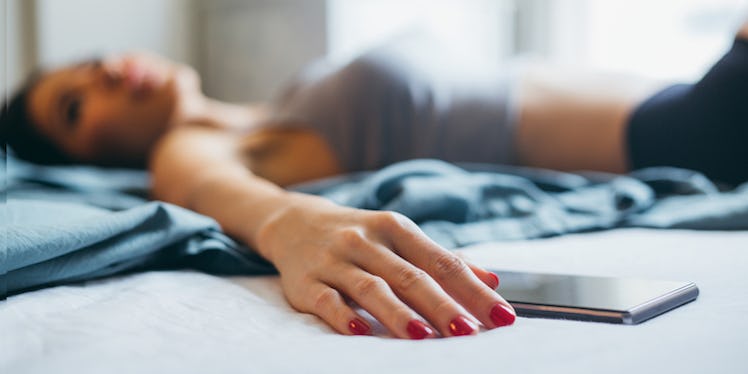
6 Signs You Might Have Sleep Apnea, And What You Can Do About It
Late actress Carrie Fisher's autopsy was recently released.
It revealed that Fisher's untimely death in December 2016 may not have only been due to drugs, but also sleep apnea.
Sleep apnea is a serious disorder that causes a person to stop breathing throughout his or her sleep cycle.
If your apnea goes untreated, you can stop breathing as many as 100 times in a night. This means that your brain, and the rest of your body, are not getting enough oxygen.
Woah.
There are two types of sleep apnea: obstructive and central.
Obstructive sleep apnea is when the soft tissue in the back of the throat collapses, blocking the airway passage.
Central sleep apnea, on the other hand, is when, though the airway is not blocked, the brain fails to signal the muscles to breathe.
Either way, both types sound scary AF.
Here are a few signs to look out for that may indicate you're at risk of developing this disorder.
1. If You Snore
People who have sleep apnea snore intensely. Like a bear.
No, I'm serious. Snoring happens when air is restricted from moving easily through the airways.
Now, if you snore lightly every now and again, you're fine. This does not mean you have sleep apnea.
However, if you tend to snore like a damn wildebeest, you might have the disorder.
This means that, every single night, your snoring is obnoxiously loud, disruptive, and almost sounds like you are choking to catch your own breath.
Believe me when I say that description is beyond accurate. I've been the disturbed bed partner beside someone with sleep apnea before. It is honestly terrifying, and always keeps you on the lookout to wake him or her up whenever you notice that their breathing stops.
2. If You Are Gasping For Air In The Middle Of Your Sleep
Like I said earlier, it almost sounds like you're literally choking to catch your breath.
That's because you really are.
While you should be sleeping, your airway is experiencing blockage, so you're actually fighting to breathe.
Scary sh*t, right?
3. If You Wake Up In The Morning With Headaches
If you don't sleep beside someone at night, then you might not have anyone there to let you know that you were gasping for air all throughout your sleep, so the next telling sign is a morning headache.
The headache results from airway obstruction. When the airways are blocked, changes happen in your bloodstream.
If the lungs cannot move air in and out, the carbon dioxide level in your bloodstream increases. As the carbon dioxide level increases, the blood vessels around the head dilate, resulting in throbbing -- in other words, a migraine.
Wow. This is a lot.
4. If You're Extra Tired During The Day
The thing is, you'd be extra tired during the day because you actually didn't sleep at night.
You spent the majority of the night trying to simply breathe. So, instead of having a good night's rest, you're only sleeping in fragments. Crazy, right?
(This is why you shouldn't take seemingly simple bodily functions for granted, FYI. Some people are just struggling to breathe.)
5. You Have High Blood Pressure
Blood pressure and lack of sleep are directly correlated, because when your brain realizes it wasn't receiving much oxygen, it spikes your blood pressure.
Your body becomes accustomed to this, and high blood pressure persists throughout the day, even when you are breathing and functioning normally.
6. You Have Mood Swings Or You're Just Super Irritable
Well, anyone knows that #TeamNoSleep is also #TeamDoNotTalkToMe.
Sleep apnea affects your ability to think throughout the day, and it's easier to become stressed and depressed as a result.
Here's What You Should Do About It
First of all, go to your doctor immediately.
This is not something to play with. Your doctor can prescribe you over-the-counter medicine that can aid in your sleep cycle.
However, if you prefer to self-treat, lucky for you, this disorder is treatable.
Weight loss, exercising, and avoiding caffeine and heavy meals are just a few things that can help.
Also, establishing a healthy bedtime ritual is helpful as well.
Sleep is often something that is underestimated, but there's absolutely nothing cool about being part of #TeamNoSleep.
Make sure you are always checking in with your body to ensure that you're functioning as you should.